All Academy Symposium on "INTERRELATIONSHIP OF BUSINESS AND PUBLIC GOODS" AoM Annual Conference, Atlanta, August 2017
A Colloquium on “Is A Living Wage Bad for The Economy?” A contribution to the implementation of SDG 8 of the 2030 Agenda for Sustainable Development.
Greening the World Trade Organisation is an imperative to accompany the implementation of the Paris Agreement adopted during the COP 21 in December 2015.
“Yet, there is no place for complacency. Time is running out, and unless decisive steps are taken to speedily walk the talk and translate ambitious global commitments into concrete actions at global, regional, national and local levels, the Paris Agreement will fail to deliver and sufficiently reduce climate change” (ECPDM editorial, May/June 2016).
A UN Library organised by the United Nations Office Geneva in collaboration with CSEND on Wednesday 15 June 2017. This Library event aims to debate the philosophical, economic, social, and pedagogical aspect of education in the context of achieving SDG Goal 4, “Ensure inclusive and equitable quality education and promote lifelong learning opportunities for all”.
Setting the Scene by Raymond Saner, DiplomacyDialogue, CSEND 
SDGs and Agenda 2030 by Joost Monk, NORRAG 
International Cooperation on TVSD by Michel Carton 
Neoliberalism and Education: a book presentation by Sacha Varin 
Book Leaflet on “Neoliberalism and Education” 
Text of presentation 
Reflections on the SDG Implementation as A Holistic Endeavour – SDC’s Contribution by Sabina Handschin, Swiss Agency for Development and Cooperation 
Cognitive Capacity to Adapt and Reinvent by Lichia Yiu, CSEND 
CSEND management team participated in the 2016 UNECE conference on PPP and SDGs. Particularly, Raymond Saner developed an evaluation grid to assess PPP case examples which were discussed during the morning session of the 3-day conference.
Democratizing the PPP standard setting process of the health sector.
Participation of Civil Society Organisations in the United Nations and in the Aid Effectiveness Discourse and Related Standard-Setting Negotiations.
Is Private-Sector Participation in Water Provision the Right Option for Developing Countries? An Analysis through Case Studies.
A special CSEND Dialogue session on "Socio-Economic Dimensions of Formalising Informal Economy: Impediments, needs and gender issues" on the 17 July 2014.
The majority of economic activities in the least developed countries are in the "informal sector". Workers and micro entrepreneurs alike in the informal economy are often trapped for a whole lifetime in conditions of precarious living and rarely get out of poverty. What could be the appropriate intervention strategies and the timing for such interventions so that the micro entrepreneurs really benefit from formalisation? What are the socio-economic and gender issues yet to be addressed?
CSEND organised a book vernissage in La Paz, Bolivia in June 2001. The book’s title is “Negociaciones en Cambio Climático y Ambiente:Dinámica global y local (Climate Change and Environmental Negotiations: Global and Local Dynamics)” and is edited by Raymond Saner, Sergio Jauregui, Lichia Yiu and published by Los Amigos del Libro, La Paz, 2001. The book consists 308 pages see below. here
At the core of Biotrade activities is the commercialisation of biodiversity based products and raw materials. This paper will look into one specific aspect of the BioTrade; namely: Natural ingredients from medicinal and aromatic plants for cosmetics and bio- pharmaceuticals. These natural ingredients include essential oils, natural dyes, soapy, creams, butter, and moisturizers in case of cosmetics and extracts and infusions from medicinal plants, natural medicines capsules in case of pharmaceuticals. Constraints and challenges in implementing BioTrade based on Nagoya Protocol for fair benefits sharing will also be discussed in order to meet the basic principles of BioTrade.
People are at the core of organizations whose mission is to deliver aid, through local communities working to generate income, and through national and international leaders working to shape policies and create good governance. At various levels, these interventions aim to lift people and communities out of poverty and ensure a decent standard of living.
Invitation and Programme, see link
Introductory Remark by UNOG DG, see link
Summary of the Discussion, see link
Table of Content, see link
Introduction (Chapter 1) of the book, see link
WTO Public Forum on BioTrade: CSEND + UNCTAD, September 2015
Biodiversity is essential for the health of the planet's ecosystems and for the livelihood of rural communities in developing countries where 70 per cent of the world’s poor live (CBD Secretariat). These communities are highly dependent on sourcing natural resources to satisfy their basic needs and to generate income and are increasingly threatened by the loss of biodiversity. The roundtable was organized by the Centre for Socio-Eco-Nomic Development (CSEND) and the United Nations Conference on Trade and Development (UNCTAD). Panelists were from international and intergovernmental organizations, a development bank, academia and from civil society who together discussed the opportunities and challenges for scaling up BioTrade while respecting the sustainable development policy objectives.
This Round Table offered an opportunity to exchange between diplomats, representatives of international organizations, experts, academics, researchers, journalists, and civil society actors, the principles and activities that contribute to sustainable development in a globalized world in constant change. In an open discussion, panelists, who are experienced professionals, expressed their opinions and made recommendations. During the second part of the Round Table, the panelists focused on different issues relevant for sustainable development such as security (inside and outside borders), employment, education and training, health, environment and sanitation of the environment, and information and communications technology (ICT). The event was organized by CSEND and COMDEV in collaboration with the Geneva Welcome Center and the Swiss Press Club.
![]()
SESSION 29: PLURILATERALISM AGAINST MULTILATERALISM?: A MULTI-STAKEHOLDER PERSPECTIVE*
Tuesday, 25 September 2012, 18:15 — 20:15, Room S3
This session aimed to discuss the concepts of multilateralism and plurilateralism and to assess the potential impact of plurilateral agreements within the WTO multilateral trading system. Plurilateral agreements can be concluded by three or more WTO members and cover trade issues labelled WTO plus, extra or minus. They can be adopted both within and outside the WTO framework. They can be "preferential" agreements or agreements based on the most-favoured-nation (MFN) principles. Future plurilateral trade agreements negotiated within the WTO could bring more transparency, and third parties' rights would be better protected under the WTO dispute settlement procedure.
If a plurilateral agreement is adopted outside the WTO framework, other WTO members need not be included, and negotiations would not include other WTO members not party to the agreement. It would then lead to the creation of a "soft law", since a plurilateral agreement outside the WTO would not have the same legal and political weight and could not aspire to an "international standard". A plurilateral trade agreement within the WTO that extends MFN benefits to non-treaty WTO members would avoid trade distortions. Conversely, if a WTO-based plurilateral trade agreement is kept as a preferential agreement (non-MFN), it would avoid free-riding by non-members and provide an incentive for others to join.
![]()
The seminar was organized jointly by Centre for Socio-Eco-Nomic Development (CSEND), UNCTAD, Future of the UN Development System (FUNDS) and Business Systems Laboratory.
A newly published book was introduced and a subsequent thematic debate focused on the question whether the current approach to measuring sustainable development is good enough to support sustainable development in developing countries. This debate is part of the larger discourse on Post-2015 sustainable development goals.
Important ideas were discussed such as the need to bring back immediacy and depth to the notion of sustainability; the need to measure comprehensively sustainable development (e.g. the current analytic framework does not measure social sustainability); the interface between individual behavior and institutional rules; the inter-generational aspect of sustainability and its cross-cultural perspective; and the importance of measuring progress towards human development goals.
25 June 2012
1st Introductory Workshop on “Reconstructing the Social Fabric of Communities after War Trauma”
Humanitarian workers are confronted with systemic challenges when helping post-traumatic communities reconnect and rebuild. Specific skills and knowledge are needed to provide social reconstruction of the community and healing of collective and individual traumas. At the same time, support is also needed for the helping professionals who are often exposed to the danger of burn-out. “Sense making” is an important element in dealing with this occupational stress.
How can organizations like the United Nations, the World Bank, the World Health Organization, and the Red Cross become more effective in their vital and laudable mission? How can multinational corporations contribute meaningfully to global issues like climate change, poverty reduction and equitable economic growth? What enables enterprises to grow and develop in challenging settings like the aftermath of a devastating Tsunami?
These questions are all related to humanitarian work psychology and have so far been largely overlooked by global development policy and policy makers. A first roundtable was organised in Geneva to discuss the relevance and needs to form a new area of study, namely, humanitarian work psychology in order to effectively address the needs of the humanitarian workers.
CSEND organized a side event on Monday, 23rd April titled ‘Linking human capital development with employability organizational and national competitiveness for sustainable growth and social cohesion’, from 12.30-14.30 hrs at Qatar conference site QNNC.
Presentations were made by Prof Raymond Saner, Diplomacy Dialogue, Geneva, Mrs Shaza Khalil and Mr. Ganim Al-Naimi, both from Qatar Foundation, Prof Lichia Saner Yiu, CSEND and Dr. Magdi Faharat, UN-ECA who also acted as discussant.
Seminar during the WTO Ministerial Conference (MC-8) of 15-17 December 2011). CSEND organised a side event focusing on the analysis of policy coherence of assistance instruments and policies made available to LDCsin to improve their service export sector. A case example from the tourism sector was used to illustrate existing policy fragmentation and lack of complementarity amongst key development instruments, i.e., DTIS, AM, PRSP etc. The Analysis was based on an in-depth study of 14 LDCs published in 2011.
Summary of AoM meeting 2010 Montréal/Canada, 9TH August, 2010 (Session 706)
AoM Caucus on applying ODC in developing and least developed countries to help reduce poverty, support employment creation and strengthen sustainable development
Written by Super User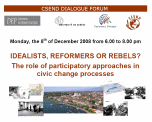 The CSEND Dialogue Forum held a session on the 8th of December 2008 on the topic of "The role of participatory approaches in civic change processes" presented by Christine Ziegler, an expert for participatory processes.
The CSEND Dialogue Forum held a session on the 8th of December 2008 on the topic of "The role of participatory approaches in civic change processes" presented by Christine Ziegler, an expert for participatory processes.
Place: University of Geneva, Uni Mail
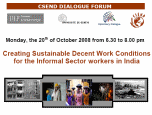 The Centre for Socio-Eco-Nomic Development (CSEND) is pleased to invite you to a CSEND Dialogue Forum session on the topic of Creating Sustainable Decent Work Conditions for the Informal Sector workers in India presented by Mr Solomon on the 20th of October 2008.
The Centre for Socio-Eco-Nomic Development (CSEND) is pleased to invite you to a CSEND Dialogue Forum session on the topic of Creating Sustainable Decent Work Conditions for the Informal Sector workers in India presented by Mr Solomon on the 20th of October 2008.
Place: University of Geneva, Uni Mail
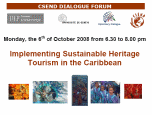 The Centre for Socio-Eco-Nomic Development (CSEND) is pleased to invite you to a CSEND Dialogue Forum session on the topic of Implementing Sustainable HeritageTourism in the Caribbean presented by Dr. Keith Nurse on the 6th of October 2008.
The Centre for Socio-Eco-Nomic Development (CSEND) is pleased to invite you to a CSEND Dialogue Forum session on the topic of Implementing Sustainable HeritageTourism in the Caribbean presented by Dr. Keith Nurse on the 6th of October 2008.
Place: University of Geneva, Uni Mail
![]() CSEND is pleased to present Dr. Aboubakr Abdeen Badawi as the speaker at the CSEND Dialogue Forum. The forum is entitled “Career Guidance, Migration, Labor Markets’ Efficiency, Quality of Training and Democracy: Is There a Link?” and is scheduled for the 23rd of July, 2008.
CSEND is pleased to present Dr. Aboubakr Abdeen Badawi as the speaker at the CSEND Dialogue Forum. The forum is entitled “Career Guidance, Migration, Labor Markets’ Efficiency, Quality of Training and Democracy: Is There a Link?” and is scheduled for the 23rd of July, 2008.
Place: Uni-Mail, Room M R170, Geneva
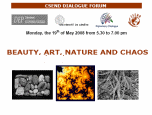 Third edition of CSEND Dialogue Forum on the topic of "Beauty, Art, Nature and Chaos" presented by Prof. John Briggs, on the 19th of May 2008, at University of Geneva, Uni Mail.
Third edition of CSEND Dialogue Forum on the topic of "Beauty, Art, Nature and Chaos" presented by Prof. John Briggs, on the 19th of May 2008, at University of Geneva, Uni Mail.
Place: Uni-Mail, Room M S030, Geneva
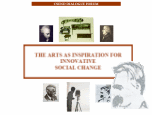 Second edition of CSEND Dialogue Forum on the topic of "The Arts as Inspiration for Innovative Social Change" presented by Prof. Pierre Guillet de Monthoux on the 15th of October 2007, University of Geneva, Uni Mail.
Second edition of CSEND Dialogue Forum on the topic of "The Arts as Inspiration for Innovative Social Change" presented by Prof. Pierre Guillet de Monthoux on the 15th of October 2007, University of Geneva, Uni Mail.
Place: University of Geneva, Uni Mail
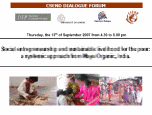 Announcing the first CSEND Dialogue Forum on the topic of "Social entrepreneurship and Sustainable Livelihood for the Poor" with a case example from Maya Organic in India. 13 Septembre 2007
Announcing the first CSEND Dialogue Forum on the topic of "Social entrepreneurship and Sustainable Livelihood for the Poor" with a case example from Maya Organic in India. 13 Septembre 2007
Place: Uni Mail, University of Geneva, Room 1130
Benchmarking conference on "Best Management Practices of In-Service Training Functions" for Swiss and Chinese officials, and executives of state-owned Chinese enterprises, Geneva, 1996.
Place: Geneva
Since 1997, CSEND is also responsible for one of the research networks of SASE, "Development, Social Change and Governance", and organised panels for the annual conference in Vienna (1998) and Madison, Wisconsin, (1999).
Place:
Vienna
![]() CSEND organised five panels for the Eighth Annual Conference of the Society for the Advancement of Socio-Economics (SASE) in July, 1996. The conference, held in Geneva, drew nearly 700 participants from throughout the world. Speakers and panelists, representing disciplines as diverse as sociology, economics, psychology, political science and anthropology, presented papers and stimulated discussions of conference issues.
CSEND organised five panels for the Eighth Annual Conference of the Society for the Advancement of Socio-Economics (SASE) in July, 1996. The conference, held in Geneva, drew nearly 700 participants from throughout the world. Speakers and panelists, representing disciplines as diverse as sociology, economics, psychology, political science and anthropology, presented papers and stimulated discussions of conference issues.
Place: Geneva
Place: Paris
Place: Quebec
Seminar on "Telecommunications and Information Technology:Tools for Sustainable Development in Asia (jointly organised with International Telecommunication Union). A programme seminar organised in conjunction with the Annual Meeting of the Board of Governors of Asian Development Bank,Geneva, 27-29 April, 1997.
Place: Geneva
SME Development in Economically Depressed Areas: A World-wide Comparative Evaluation of Organisational Goals, Vitality, and Outcomes
Written by Super UserPlace: Chicago
Cross-Border Transfer of Management Knowledge for Large System Change
Written by Super UserPlace: Chicago
Management and Organisation Development Across Borders: The Use of Technology Based Learning Processes by Multinational Companies
Written by Super UserPlace: Chicago
European Entrepreneurship and Small Business Research: Methodological Openness and Contextual Differences
Written by Super UserPlace: San Diego
Place: San Diego
Action Learning with Virtual Transnational Teams: Management Training in Asia
Written by Super UserPlace: San Diego
Conducting Change Projects in the United Nations and Related Intergovernmental Organisations: How to Deal with Porous Boundaries?
Written by Super UserPlace: Boston
Information Technology & National Competitiveness in Developing Countries
Written by Super UserPlace: Boston
International Seminar on Governance Policy of Tertiary Education Development, hosted by the Ministry of Education, China.
Place: Beijing and Guiyang, China
CSEND made a presentation entitled "Designing OD Interventions based on the use of Blended Learning for MNCs" at the European Association of Distance Teaching Universities' (EADTU), 20th Anniversary Conference in November 2007 hosted by the Universidade Aberta, Lisbon, Portugal
Place: Universidade Aberta, Lisbon, Portugal
![]() EADTU Conference Programme
EADTU Conference Programme
CSEND sponsored a side event : Scaling Up Energy Efficiency under the CDM - Do We Need a "Plan B" ? at 2007 COP 13 of the UNFCCC .
Place: Bali, Indonesia
Presentation Agenda/Speakers Presentation
International Search Conference on Governance, Financing and Quality Assurance of Higher Education in China and Switzerland 17th - 18th April 2007 in Zurich, Switzerland, hosted by ETH Zurich
Place: Zurich, Switzerland
Learning technologies for Institution Building and Government Learning, 26 October, 2006
Place: Ljubljana
![]() Article
Article
ISO standards come to the aid of HRD, 6 July, 2006
Place: New Delhi, India
![]() Article
Article
Multi-stakeholder Diplomacy: Challenges and Opportunities, MPA Sciences Po, 22 March 2006
Place: Paris, France
View
Decent Work, Poverty Reduction and PRSPs, Thematic Review and Cross-country Experiences, ILO Staff Seminar, Turin, 16-19 September, 2003
Place: Turin, Italy
View
Pursuing the Kyoto Protocol: International Cooperation in Global Climate Changes, AOM, Denver 2002
Place: Denver
![]() Article
Article
An All Academy symposium at the Academy of Management Annual Meeting in Washington DC in 2001
Place: Washington DC
![]() Article
Article
Geneva 2000 Forum for the World Summit for Social Development, 22-30 June 2000, Geneva
Place: Geneva
Chaos Theory and the Arts in the Context of Social, Economic and Organisational Development
18-21 March, 2000, Pari, Italy
Place: Pari, Italy